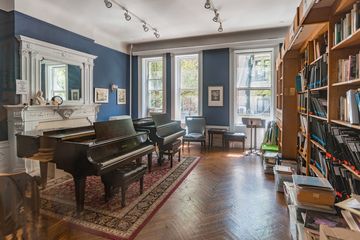What makes the Bloomingdale School of Music unique is an "openness to anyone who comes. " I spoke to Erika Floreska, the director, who described the school's diverse student body to me: ten percent are in early childhood classes and ten percent are adults, with the rest of the participants filling in the ages in between. Additionally, twenty percent of the families who attend Bloomingdale School of Music are in an income bracket of less than $40, 000 per year, thanks to a robust scholarship program. The Bloomingdale School of Music was founded in 1964 by David Greer, the organist at the West End Presbyterian Church. He started out teaching classes in the church's basement before moving to 108th Street in 1972. Erika showed me the school's original sign, which advertises music lessons for fifty cents and a dollar. From the start, Bloomingdale has been "a place where anybody can come and play music. " In 1972, the school moved into its current building. At the time, music education was being removed from the public school system. Therefore, more and more children would walk from school straight to Bloomingdale. Since then, their purpose has remained constant, with the structure shifting slightly to meet the needs and requests of the community. For instance, in 2016, Erika is finding that the vocal department is growing, and more and more students are interested in learning jazz and musical theater styles. The lifeblood of Bloomingdale School is the staff. There are fifty-five instructors who cover over twenty instruments. After showing me various practice rooms, some of which can be rented by outside musicians, and meeting some of the passionate teachers, Erika led me back to the ground floor and out the door to the garden. It was here that I was introduced to people preparing for one of the school's Jam Sessions. The guitar teacher, Gabe, had a barbecue set up and was making food for the event, which would feature anyone who wished to share something - from a three year old who was learning a piece from a lesson, to an older student rehearsing an audition piece for conservatory. At this time, I also met Brandon, the assistant director, who had been involved with the program over twenty years ago, and Ling, who started as a student and now works for the school. I spoke to Monica, who has been a piano teacher for seventeen years and who wrote the history of the school for their website. Erika said that since she has joined the team, she has tried to "build on the community feeling. " She loves that at Bloomindale, everyone is part of a family. In addition to the jam sessions, Bloomingdale has themed concerts throughout the year. These concerts can focus on a specific instrument, such as guitar and piano festivals, or a topic, like "music of the Americas. " Bloomingdale has also started offering composition workshops in conjunction with the New York Philharmonic. Erika confidently stated, "Anyone can compose, " and described the layout of the workshop, which involved both writing one's own as well as playing classmates' pieces. "It's a program that highlights creativity and finding your voice. " Erika then shared a story of how one student wrote something for the recorder, bongos, and violin, since those were the instruments her three friends played. "These kids are serious about this. " In terms of other events, the instructors offer free concerts from October to June that are open to the public, and are a way of bringing high quality musical performances to lower income audiences. When I visited - at the end of August in 2016 - it was the first time that Bloomingdale had offered a summer camp with a specific focus on a book with narration called "The Carnival of the Instruments. " Two of the piano teachers had the idea: the campers, who ranged from six to ten years old, learned the basics of music while also engaging in arts and crafts. They made their own instruments, took part in movement classes, and were taught some piano. Erika said that at the end of the camp session, the kids wrote a song for Bloomingdale, which she described as, "The cutest thing I ever heard. "One of the last touching stories shared with me before leaving took place in 2014 when Bloomingdale had a fiftieth anniversary concert at West End Presbyterian Church, where it all began. A notice was sent out to the school's community, stretching back to its inception, inviting anyone who was interested to come on stage to play Beethoven's "Ode to Joy. " Erika shared that while usually the audience at Bloomingdale attracts about 150 people, during this concert, there were 150 people playing on the stage. The church was jam packed - including people seated up in the balcony - a clear symbol of the great appreciation that has been felt throughout the city for this inspirational school of music.

